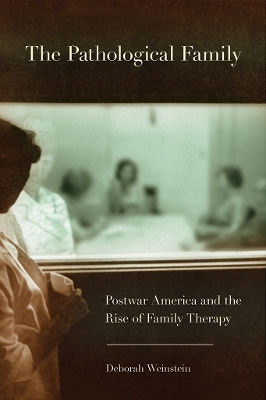
The Pathological Family
Postwar America and the Rise of Family Therapy
Seiten
2013
Cornell University Press (Verlag)
978-0-8014-5141-6 (ISBN)
Cornell University Press (Verlag)
978-0-8014-5141-6 (ISBN)
- Lieferbar (Termin unbekannt)
- Versandkostenfrei innerhalb Deutschlands
- Auch auf Rechnung
- Verfügbarkeit in der Filiale vor Ort prüfen
- Artikel merken
While iconic popular images celebrated family life during the 1950s and 1960s, American families were simultaneously regarded as potentially menacing sources of social disruption. The history of family therapy makes the complicated power of the family at midcentury vividly apparent. Clinicians developed a new approach to psychotherapy that claimed to locate the cause and treatment of mental illness in observable patterns of family interaction and communication rather than in individual psyches. Drawing on cybernetics, systems theory, and the social and behavioral sciences, they ambitiously aimed to cure schizophrenia and stop juvenile delinquency. With particular sensitivity to the importance of scientific observation and visual technologies such as one-way mirrors and training films in shaping the young field, The Pathological Family examines how family therapy developed against the intellectual and cultural landscape of postwar America.
As Deborah Weinstein shows, the midcentury expansion of America’s therapeutic culture and the postwar fixation on family life profoundly affected one another. Family therapists and other postwar commentators alike framed the promotion of democracy in the language of personality formation and psychological health forged in the crucible of the family. As therapists in this era shifted their clinical gaze to whole families, they nevertheless grappled in particular with the role played by mothers in the onset of their children’s aberrant behavior. Although attitudes toward family therapy have shifted during intervening generations, the relations between family and therapeutic culture remain salient today.
As Deborah Weinstein shows, the midcentury expansion of America’s therapeutic culture and the postwar fixation on family life profoundly affected one another. Family therapists and other postwar commentators alike framed the promotion of democracy in the language of personality formation and psychological health forged in the crucible of the family. As therapists in this era shifted their clinical gaze to whole families, they nevertheless grappled in particular with the role played by mothers in the onset of their children’s aberrant behavior. Although attitudes toward family therapy have shifted during intervening generations, the relations between family and therapeutic culture remain salient today.
Deborah Weinstein is Assistant Director of the Pembroke Center at Brown University, where she also teaches in Gender and Sexuality Studies.
Introduction: The Power of the Family1. Personality Factories2. "Systems Everywhere": Schizophrenia, Cybernetics, and the Double Bind3. The Culture Concept at Work4. Observational Practices and Natural Habitats5. Visions of Family LifeEpilogueNotes
Bibliography
Index
| Reihe/Serie | Cornell Studies in the History of Psychiatry |
|---|---|
| Zusatzinfo | 8 Halftones, black and white; 2 Tables, unspecified |
| Verlagsort | Ithaca |
| Sprache | englisch |
| Maße | 155 x 235 mm |
| Gewicht | 907 g |
| Themenwelt | Geisteswissenschaften ► Geschichte ► Regional- / Ländergeschichte |
| Geisteswissenschaften ► Psychologie ► Familien- / Systemische Therapie | |
| Medizin / Pharmazie ► Medizinische Fachgebiete ► Psychiatrie / Psychotherapie | |
| Sozialwissenschaften ► Soziologie | |
| ISBN-10 | 0-8014-5141-8 / 0801451418 |
| ISBN-13 | 978-0-8014-5141-6 / 9780801451416 |
| Zustand | Neuware |
| Informationen gemäß Produktsicherheitsverordnung (GPSR) | |
| Haben Sie eine Frage zum Produkt? |
Mehr entdecken
aus dem Bereich
aus dem Bereich


